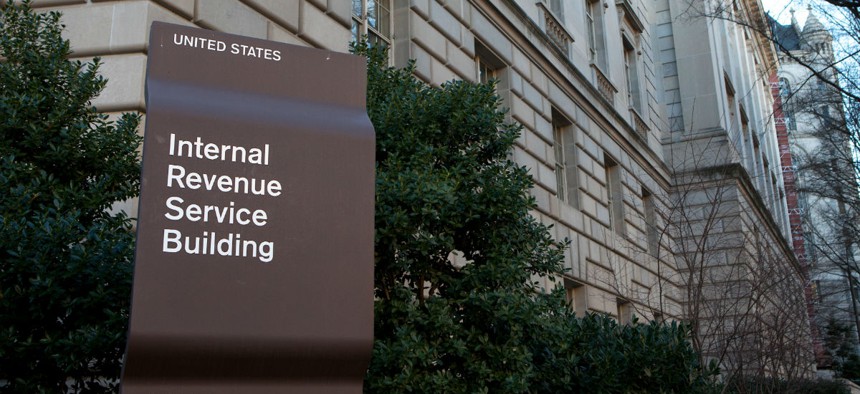
Mark Van Scyoc / Shutterstock.com
IRS Faulted for Future Plan to Streamline Customer Service
Taxpayer advocate also says too many undeserving groups won tax-exempt status.
A still-unreleased Internal Revenue Service plan for restructuring its customer service to cope with budget cuts could mean the agency is “on the verge of dramatically scaling back telephone and face-to-face service it has provided for decades to assist the nation’s 150 million individual taxpayers and 11 million business entities in complying with their tax obligations,” the National Taxpayer Advocate said on Wednesday.
The so-called “Future State Plan,” preparation of which has involved all IRS business units and cost several million dollars in management consultant fees, contains “many positive components,” among them “creating online taxpayer accounts through which taxpayers will be able to obtain information and interact with the IRS,” Taxpayer Advocate Nina Olson said in summarizing her 2015 annual report. Cuts to the IRS budget – about 19 percent in inflation-adjusted terms since fiscal 2010 – “have forced the IRS to explore cheaper service options,” her report acknowledged.
Overall, the plan is reportedly designed to move more taxpayer services online while increasing the role of paid tax return preparers and software companies, a “pay to play” approach that “likely would increase compliance costs for millions of taxpayers who now obtain that assistance from the IRS for free,” the advocate wrote.
“Implicit in the plan – and explicit in internal discussion – is an intention on the part of the IRS to substantially reduce telephone and face-to-face interaction with taxpayers,” said the report, which also expressed concerns about data security with third-party involvement. “The key unanswered question is by how much. It is incumbent upon the IRS to be much more specific about how much personal taxpayer assistance it expects to provide in its ‘future state.’ Technology improvements often do not reduce demand for personal service to the extent expected,” the report said.
Olson also recommended that the IRS solicit public comment on the future plan and that Congress conduct hearings.
Among dozens of other issues addressed in the report were Olson’s concerns about the IRS’ plan to boost use of user fees in arrangements with delinquent taxpayers, which “may have the effect of deterring taxpayers from using IRS services that promote compliance, thereby reducing voluntary compliance and potentially costing the government more in tax than it would earn in user fees.”
The report also offered some startling criticisms of the agency’s simplified “EZ” application form for nonprofits applying for tax-exempt status—the area that prompted the two-year political controversy over alleged bias against conservative groups.
The IRS approves about 95 percent of applications submitted on Form 1023-EZ, the report said, but the IRS’ own data show that when it requests documentation from applicants, that approval rate goes down to 77 percent. A study by the Taxpayer Advocate Service found that of those recently approved, 37 percent “do not meet the organizational test for qualification as an IRC § 501(c)(3) organization.” In addition, “30 percent of these organizations’ articles of incorporation do not have an acceptable purpose clause,” the report stated.
“To the extent these organizations receive amounts that should be treated as taxable receipts they are improperly subsidized by other taxpayers,” the report said.
The IRS responded on Wednesday with a statement that the report “does not paint a full picture of these evolving Future State efforts. The advocate seems to want the IRS to continue to do business the way we did 10 years ago. Our Future State work is fueled by taxpayer demand for new and different options for getting services, including expanding secure online options. The IRS remains fully committed to personal service to taxpayers, and the IRS believes increasing the availability of self-service interaction frees up in-person resources for taxpayers who truly need them, including those who are not comfortable online or don’t have personal access to a computer.”
The agency added that the initiatives for simplifying taxpayer interactions are “ongoing and have not been finalized, and the IRS emphasizes feedback from outside parties [that] has been and will continue to be an important part of the process.”
House Ways and Means Committee Chairman Rep. Kevin Brady, R-Texas, on Wednesday called the advocate’s report “troubling.” He said, “When Americans contact the IRS, they need serious help – not another layer of bureaucracy. This comprehensive report highlights significant problems taxpayers face when dealing with the IRS and raises serious questions about the agency’s commitment to making it easier for people to do their taxes. IRS employees' main priority should be to deliver excellent customer service to hardworking taxpayers who fund our government and pay their salaries. Ways and Means members will continue to conduct rigorous oversight of the IRS and its plans in the months ahead.”
(Image via Mark Van Scyoc / Shutterstock.com)







